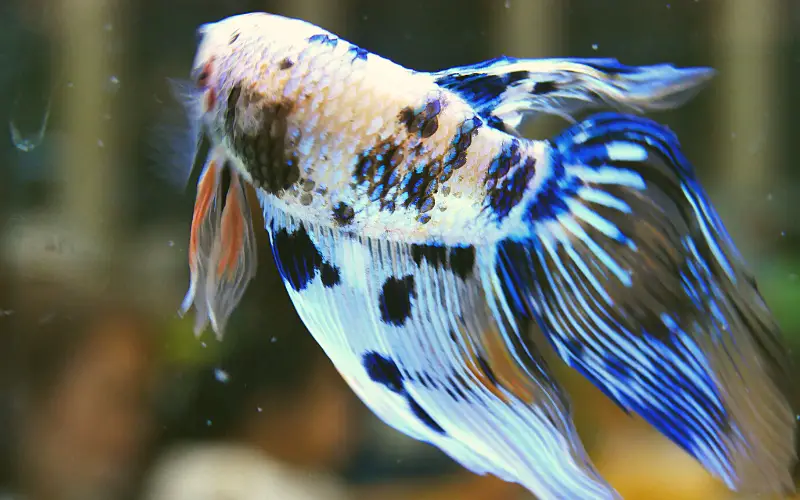Are you worried that your beloved betta fish is turning white? While it can be alarming to see a change in their color, it can also be a sign of underlying health problems. So, Why is my betta fish turning white?
Too many fish owners don’t know what to do when their fish starts losing its color and turns white.
If your betta has turned white, there’s a good chance it’s stressed, sick, or has a parasite. These problems can lead to death.
With the proper knowledge and professional advice, however, you can often identify the cause and take steps to fix any issues your fish may have.

We’ll cover the symptoms of various illnesses caused by changes in water temperature or quality, as well as possible treatments that restore vibrant coloring from head to fin!
In this blog post, we’ll explore why bettas turn white and offer tips on returning them to total health. Read on for more insights into this common but serious condition affecting our scaleless friends.
Table of Contents
ToggleWhy Is My Betta Fish Losing Its Color?
Why Is My Betta Fish Color Fading? As time passes, marble bettas tend to experience a gradual loss in vibrancy.
Although it is not uncommon for the colorful fish to live up to five years when taken care of properly, an aging betta may show subtle changes like fading color as its lifespan increases.
However, if your betta is suddenly turning white, then the issue could be more serious. The most common cause of the sudden whitening of betta is stress and poor water quality.
Betta fish losing color and not swimming can signify something serious, such as an internal parasite or disease. Act quickly and take your infected fish to the vet if you notice any of these signs.
Betta fish are susceptible to changes in their environment and water parameters, so any significant fluctuations can cause them to become stressed and unhappy.
This can lead to a loss of color or an overall paleness, especially around the fins and gills.
An attack by a more aggressive fish can be an extremely stressful experience for your betta, potentially leading to dulling of its vibrant colors.
To protect it from further trauma, you may consider relocating the betta to a healthy tank that won’t compete with other inhabitants.
What Does It Mean When Your Betta Fish Starts Turning White?
A stressed betta fish may show signs of illness if it is afflicted with ich, a common parasitic malady.
This affliction can cause noticeable white spots to form on its skin and also lead to fatigue, decreased appetite, and the tendency for them to rub against items in its tank as they attempt to find relief from this unwelcome intruder.
If your betta is turning white, it may also have bloated up with swim bladder disorder or dropsy. Swim bladder disorder is caused by a bacterial infection and can lead to an inability to maintain proper buoyancy.
Dropsy, on the other hand, is caused by either a bacterial or viral infection. It can result in the fish having an abnormally swollen belly, often accompanied by white spots on its scales.
Experiencing white discoloration on your Betta fish is a sign of underlying health issues, specifically an external parasite infection such as anchor worms. Keep track of any changes in coloration to ensure that you can address the problem quickly and appropriately for optimal outcomes!
To effectively treat Anchor Worms from your fish, isolate them in a quarantine tank and use tweezers or aquarium salt as treatment methods. Although manual removal with tweezers is effective, it can be stressful for the fish so remember to handle it gently.
If left untreated, both swim bladder disorder and dropsy can lead to death.
Why Is My Betta Fish Turning White and Laying on Its Side?
Betta losing color and laying on the bottom of the tank is a common sign of anemia caused by a lack of iron in their carnivorous diet.
If your marble betta fish is lying on its side and has lost color, it could indicate that the water is too warm or that there is insufficient oxygen in the community tank.
It could also be a sign of poisoning from toxins or fungus in the tank. If your fish suffers from poisoning, it will have difficulty breathing, and its fins may become discolored.
In any of these cases, you should take it to a qualified veterinarian or aquaculture specialist for a proper diagnosis and treatment plan.
How Do I Know If My Betta Has a Disease? (Symptoms & Curing Tips)
If your betta displays signs of an illness, such as loss of appetite, lethargy, or discoloration, it may suffer from a disease.
The most common betta diseases include bacterial infections, frayed fins, fungal infections, parasitic infestations, and tumors.
Bacterial infections can cause lesions or discoloration on the skin and fins. In contrast, fungal infections often result in white patches on the body and may be accompanied by red streaks or spots.
Parasitic infestations can cause the fish to become lethargic and darker in color, while tumors may result in bumps on the skin or ragged fins.
If your betta is showing signs of any of these illnesses, it is important to take it to a veterinarian for a proper diagnosis and treatment plan.
Sometimes, an illness can be cured with antibiotics, anti-fungal medications, or other treatments. In more severe cases, surgery may be needed to remove the tumor or infected area.
Additionally, regular water changes and maintenance are essential for preventing disease.
What to Do If My Betta Fish Is Turning White?
Many betta fish owners experience their beloved fish turning white at some point. This can signify many different illnesses, all of which require other treatments.
Knowing what to do if your betta fish turns white is essential, as the wrong treatment can worsen the illness or even kill your fish.
In this video, we discuss common illnesses that cause a betta fish to turn white and outline the steps you need to take to cure them.
Can Betta Fish Get Their Color Back?
Sometimes, a betta fish that has lost its color due to illness may regain it when the underlying cause is treated. However, in more severe cases, the color may never return ultimately.
It’s essential to be aware of this when considering treatments for an aquarium fish that has lost its color.
In some cases, the best action may be to provide supportive care and ensure that the fish is comfortable while the illness continues.
It’s also important to note that if the fish has lost color due to an environmental issue such as improper water quality, the color may only return once the ecological problem is addressed.
If your betta fish has lost color due to an illness, provide the necessary treatment and supportive care for a full recovery.
How Do I Get My Betta Fish Color Back?
If you want to get your betta fish’s color back, the key is nutrition! One great color-enhancing food to offer them is live (or frozen then thawed) shrimp.
Natural colors and omega 3s in small spirulina-fed or brine shrimp are beneficial for betta coloration. Not only does it enhance their natural colors, but it can also bring back some of their vibrant hues that have faded over time.
Feed your betta any shrimp, and make sure the water conditions are right: pH should be between 6.5 and 7.5; the temperature should be 78-82 degrees; and water hardness should be 1-15 dGH (Garnier Degrees Hardness).
This helps ensure a healthy environment for your betta fish before introducing shrimp into the ecosystem!
If you’re looking to add some extra colors on top of what they already have, there are a few other options out there as well! Many flakes or pellets now contain particular added vitamins and minerals that promote rich colors in tropical fish, including bettas.
Also, add garlic packs – these provide essential nutrients that boost immunity and help color up those otherwise dull scales!
Finally, take care not to expose your betta to too much light – excessive exposure may cause bleaching, further diminishing their current pigmentation patterns.
So there you go – if you’re looking for ways to get your betta’s color back, try adding some live or frozen shrimp into the mix and specialized flake foods supplemented with vitamins & minerals, plus garlic packs if needed!
Doing this, combined with making sure they have proper pH levels and not exposing them to too much light, should help restore vibrancy & healthiness right away 🙂
Why Are My Betta Turning White and Dying?
My betta fish is turning white and won’t eat. This is a sign of a severe illness requiring immediate attention. The most common cause for this symptom is an infection caused by parasites or bacteria.

Treatment includes antibiotics, aquarium salt, antibacterial medications, and/or other therapies such as freshwater dips or salt baths.
Additionally, a routine of water changes and maintaining good water quality can help prevent future infections.
If your betta is turning white and won’t eat, it is crucial to identify the underlying cause of the illness and seek immediate treatment so your fish can return to its healthy state.
How to Treat Fin Rot in Betta Fish?
Fin rot is a common disease in betta fish caused by a bacterial or fungal infection. It results in fin erosion and can cause extreme discomfort to the fish.
To treat fin rot, an antibiotic such as Maracyn-Two or Kanaplex should be used according to the directions on the packaging.
You should also conduct frequent water changes, ideally every other day. These will keep the tank clean and help remove excess bacteria or fungi.
You should also ensure that the water temperature is in the appropriate range for betta fish and that the pH level is stable.
Finally, add a few aquarium salt baths to the water to help reduce stress, improve your betta circulation and aid in healing damaged fins.
Following these steps will help your betta fish recover from fin rot and return to full health, allowing it to care for a beautiful and vibrant fin display.
Commonly Asked Questions about Why Betta Fish Turned White (FAQ)
Why Is My Betta Fish’s Body Turning White?
A betta fish’s usually vibrant colors can gradually fade away, potentially due to the presence of ich disease – an infectious parasite in aquariums. This external infection affects a betta’s skin cells, often leading to white spots across its body.
Why Is My Betta Losing Color on His Head?
Betta fish lose color on the head due to stress or water quality issues. Ensure your betta’s aquarium is always clean and well-maintained by performing regular water changes.
Why Is My Black Betta Fish Turning White?
Black betta fish turning white can be caused by various factors, including suffering from ich, stress, poor water conditions, or poor nutrition.
Why Is My Blue Betta Fish Turning White?
If your gorgeous blue betta fish has recently taken on a white hue, it could be a sign of ich – an infection caused by parasites. Make sure to keep an eye out and take the necessary steps to ensure the health of this unique aquatic creature!
Why Is My Betta Fish Scales Turning White?
Betta fish exhibiting white scales could potentially be afflicted with a condition known as ich – so make sure to take proper precautions if you suspect the presence of this infection.
Why Is My Betta Fish Tail Turning White?
As your fish ages, it may experience a fading of its once bright colors – particularly the tail. This change could be due to age or an underlying infection and should always prompt further investigation.
Why Did My Betta Fish Turn White?
Betta turning white under chin, on the fins, and body can be a sign of infection or poor water conditions. Make sure to take the necessary steps to ensure the health of your beloved aquatic pet!
Why Is My Betta Fish Turning Grey?
Poor water quality and a bacterial or fungal infection can be the culprits when your beloved fish starts to turn grey. Ensure you’re providing optimal conditions for its health and safety to keep it vibrant!
Why Is My Betta Fish Face Turning White?
Betta’s face turning white can be due to various factors, including improper water conditions, overfeeding, or even a bacterial infection. Consult an expert if you suspect any of the above issues and take the necessary steps to restore your beloved pet’s health.
Why Is My Betta Fish Fins Turning White?
When your betta’s fins begin to turn white, it could be a sign of fin rot. If you observe any fraying or damage to the fins, this disease may have set in and must be addressed quickly. Fin rot affects their beautiful tail feathers and can spread to other parts of the betta’s body, too – don’t let them suffer from this condition any longer!
Why Is My Betta Fish Turning Black?
Betta fish turning black may be due to various factors, including poor water quality or parasites. Poor water conditions create an ideal parasite habitat, allowing them to be quickly introduced into tanks through new tank mates or live plants.
Conclusion
So, why is my betta fish turning white? In short, many potential explanations exist for why your betta is turning white. It could be a sign of poor water quality, a reaction to a new food, or even stress from changes in the tank. If you notice your betta fish’s color changing, it’s vital to take action quickly to ensure their health and well-being. By conducting regular water tests, feeding them high-quality food, and keeping their tank clean and stress-free, you can help keep your fish healthy and colorful for years to come.
You might also like
- Betta Fish Behavior Before Death: How to Save a Dying fish (Solved)
- Why Is My Betta Fish Not Moving? 5 Common Reasons (Solved)
- How Often To Feed a Betta Fish? & How Much! (Explained)
- Can Male and Female Betta Fish Live Together? (Yes, or No)
- Can Betta Fish See in the Dark! (Is It Even Possible?)
- Why Does My Betta Fish Stare at Me? (5 Reasons & Solutions)
- Betta Fish White Spots: 7 Effective Ways to Treat Ich!
- My Betta fish is Losing Color and Laying on Bottom of Tank: (Solved)
- Betta Fish Fungus or Ich: 7 Signs Your Fish Might Be in Trouble!
- Tumor in Betta Fish 101: Symptoms, Causes & Proven Treatment!




